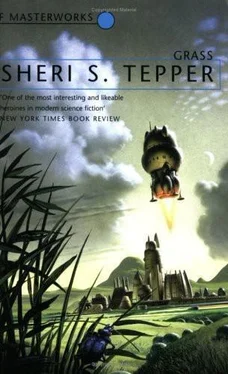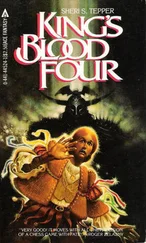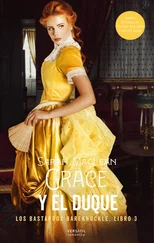“All gone, are they?”
“All gone. All died, everywhere, all sort of at once, like time had just up and ended for them. Except here on Grass. Here they all died from something tearing them apart.”
“How do you know?”
“It’s how we find ’em, Brother. An arm here, a leg there. A bone raggedy from teeth.”
“What are you looking for?”
“Something to tell us why they died, mostly.” Brother Mainoa looked at him curiously. “From what you say, you’ve seen plague, haven’t you, Brother. You know it exists.”
The other nodded. “They never told me so, but that’s what killed my family. And the Hierarch died of it. Lots of the people at Sanctity have it. I may have it, without knowing it.”
“Well, there’s some of us think that’s what killed the Arbai. Better tell you now, it’s not Acceptable Doctrine; so don’t go talking about it.”
“Killed them,” breathed Rillibee. “Going to kill us.”
“Ah. Well, there is that. Maybe not, though. If we could find out something…”
“Do you think we can find out anything about the plague?”
The other turned, the wrinkles around his eyes made deeper by the speculative squint with which the Brother was evaluating his new family member. “What I think,” he purred, “is something you and I may talk about someday after you’ve been out in the grass.” He pointed downward. There, spread across the short turf of the north, were the uncovered walls of the Arbai city and the complex network of ditches dug by the Brothers, some of them roofed with arched bundles of tall grasses. Mainoa pointed again, in the direction of their flight. Almost on the horizon, the ramified mass of the Friary bulked darkly against the pale sky. As they drew nearer, Rillibee/Lourai sucked in an astonished breath. Above the Friary floated a city of cobwebs, netted arches, and skeletal towers that moved in the light wind as though they were living things rooted in the soil far below. From some few of the lofty pinnacles flew the banners of Sanctity, complete with golden angels. On seeing these. Rillibee Chime gave one last, dwindling snarl.
“Home,” said Brother Mainoa. “Not a bad place, really. Though the sky climbers will probably make paste of you for a few weeks. Heights frighten you, boy?”
“Falling frightens me. Heights don’t.”
“Well then, I’d say you’ll survive it.”
“What are sky crawlers?” Rillibee’s stomach knotted at the picture this brought to mind.
“Boys no older than you. most of ’em. Most likely they won’t harm you much. You’ll get by; that is, you will if you can apply a few sensible restraints to your conduct.”
“Yes, Brother,” said Brother Lourai, his eyes cast humbly down. “I will try to restrain myself.”
Before Rigo had a chance to meet the Green Brothers, a morning came when the tell-me shrilled news of the lapse. The bon Damfels had assembled for the Hunt, but no hounds or mounts had appeared. Salla. one of Roald Few’s informants, had sent word to Commons and Roald had messaged Opal Hill.
Long-set plans moved into action. The embassy swarmed with cleaners and cooks, readying for the evening three days distant when the awaited reception would occur.
In the little house, Eugenie bit through a thread and bid her docile pet turn a quarter turn to the left- No one else at Opal Hill had seen Pet yet. And no one anywhere would have ever seen her like this.
At the bon Damfels’, Stavenger ticked off the list of those who would attend. Shevlok, yes. Sylvan, yes. No one younger than Sylvan. None of the young cousins. Shevlok would be ordered to pay putative court to the fragras girl, Stella, and that would solve that problem.
In Commons the musicians went over their music and instruments, the wine merchant checked his stores, the extra cooks rolled their knives in their aprons. Aircars began to dart toward Opal Hill.
At bon Smaerlok’s estancia. and at bon Tanlig’s, at all the estancias, the grown women went through their ball gowns, deciding what to wear, while their daughters sulked. None of the young women were going, it had been decided. Too dangerous. Only older women, women with good sense, women with a number of liaisons behind them. Several of them had been picked to flirt with the Yrarier son, several good-looking, experienced ones. Whatever else might occur as the result of Sanctity’s embassy reception on Grass, an inappropriate liaison with a young Yrarier was not going to be allowed. So said the elder bons.
And at Opal Hill Roderigo Yrarier went over the list of those who would attend, noting the absence of young people and simmering at the insult offered to his family and his name.
Obermun bon Haunser had remembered his promise to Marjorie when he had recommended Admit Maukerden as her “secretary.” When she first got around to interviewing the tall, self-important individual, he told her that he knew every bon in every family and who the parents were and what the liaisons had been and who was in sympathy with and who out of sorts with whom. He expected, so he said, a private suite and a salary which made Rigo blink in surprise.
“I don’t trust him,” Marjorie told Rigo.
“Nor do I,” Rigo confessed. “But hire him anyhow. Assign him something to do and let’s see what he comes up with.”
After a little thought, Marjorie asked Admit to compile a file on those who would attend the reception, giving family connections and such personal information as might be helpful to new acquaintances in conducting conversation. He spent a great deal of time at it for one who supposedly knew them all. presenting the final work with a flourish.
Marjorie thanked him with a smile which conveyed nothing but ignorance and appreciation. She and Rigo then gave the file to Persun Pollut.
“Oh, my lame left leg.” Persun muttered. “That fool doesn’t know a cousin from an aunt or a bon Maukerden from a bon Bindersen.”
“Not accurate?” she queried sweetly.
“Except for the Obermums and Obermuns, there’s hardly a thing here that’s not plain wrong. He’d of done better guessing. If you’d done any introductions on the basis of this, the bons would have had your bones for supper.”
“Which would indicate either monumental stupidity or purposeful misinformation.” Rigo grinned through clenched teeth.
“He’s intelligent enough in his own interest,” Marjorie responded. “Then he was instructed to be useless,” Rigo said. “More than useless. Destructive. Which, I think, tells us all we need to know about him and a good bit more about them.”
Thereafter, Marjorie pretended to consult Admit Maukerden from time to time and Rigo amused himself by giving the man false information about the purpose of the embassy, waiting to see which parts of it would come back to him, in whatever guise, via the bons. Meantime, Persun corrected the file on the guests and went over it with Rigo’s trusted assistant, Andrea Chapelside. It was Persun who set down accurate details about the bons. “This one is more important than he looks,” he said. “This one is malicious and will misquote you.”
And it was Persun, dressed in servant’s livery, who was assigned to circulate among the guests to hear what he could hear. Admit Maukerden, splendidly costumed to fit his idea of his own importance, would be relegated to a post near the first surface from which he could announce the arrivals with a fine and completely spurious air of authority, separated by a thwarting distance from anything that might transpire in the rooms above him. Though Marjorie doubted that anything of consequence would happen, Rigo had faith that something of great importance would follow his enormous investment of time and attention.
Читать дальше












